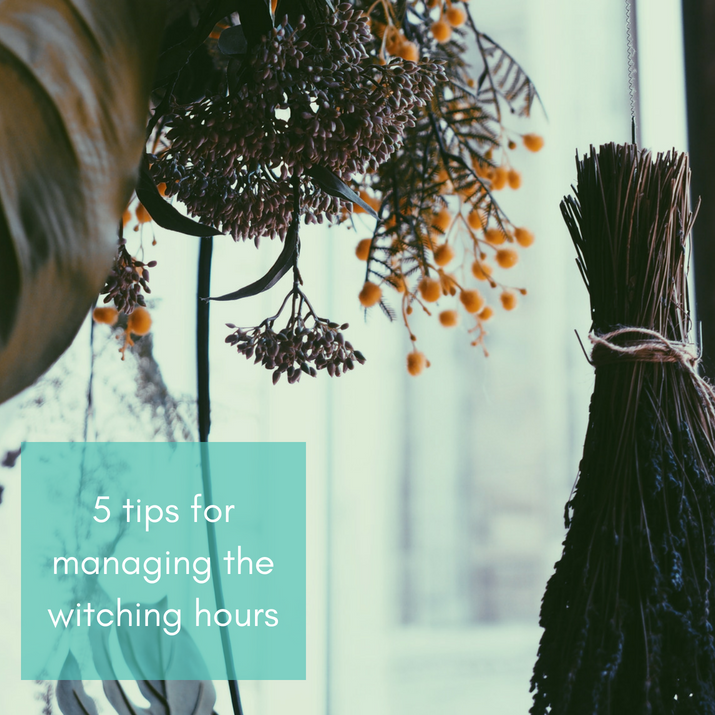Today’s post answers a reader question. You can read previous answers to readers’ questions here.
How can I be better prepared / organised for the “witching hours” of the evening (5-7 pm ish) with two young kids who need bathing & dinner etc? Particularly challenging if hubby is working late and no matter what I do this time always feels like a nightmare! Any tips appreciated:)
While it has been quite a few years since I have had very young kids, I still do remember how this time of the day could be the hardest. For many years when the kids were growing up my husband would miss most of this time of the day getting home closer to 7.30pm, often just in time to say good night to the little ones. Having five kids under 10 years of age, for me to stay sane through this period, I did have a planned approach!
1. Have a routine
The routine wasn’t just for me, but it made life easier for the kids too. Kids cope better when they know what is expected of them. The routine would kick off after school pick up with the older kids, some nights we would have after school activities, which would have a different routine, but on nights when we were home it would start with a shared afternoon tea. Hungry kids are more likely to be cranky and whiney, so having a decent afternoon tea to fill them up was essential leading into the witching hour.
We would then move into reading and homework. I had a much better chance of helping the kids with their homework if we did it earlier as the toddler and baby would be able to entertain themselves better at this time. Then we would move into free time and I would cook dinner. On some nights when the younger ones were unsettled, demanding or just whinging, I would bring out certain toys/activities that they couldn’t usually access. I would set them up with it near me, sometimes even on the kitchen floor and let them play with it. The novelty factor of the toy worked incredibly well most of the time and often just being close to me soothed them a little and I could talk to them as I cooked.
After dinner it was bath, teeth and story. Every one knew the drill. I would often run the bath before dinner was served so it made the transition between dinner and bath time quick. As a parent I have observed that so many issues arise in the family during transition times. Transition times are when kids and adults need to move from one activity or area of focus to the next. It is when we need to get the toddlers to stop playing and get dressed. It is when parents come in from work and need to switch into home mode, it is when teenagers need to get off their devices and come to dinner etc.
Transition times are challenging because very often the child or adult may not want to move from one activity to the next one they are being asked to do. For me when I have taken a break to have a cup of tea and read a book in the sunshine, there is definitely a level of resistance to go back inside the house and start cleaning for example.
But we do have to move from one activity to the next so we get to school/work on time and complete other necessary tasks of family life. Routines are one way to minimise the impact of transition times as they give more flow to the how the day goes.
2. Eat early
It has only been about the last two years that we have started eating later and by later I mean about 6.30pm. For the many years before we would eat well before 6pm. Eating early made the evenings run much smoother with the kids and I found that they ate much better. By the time my husband would get home from work, it would be far too late for the kids to eat, so we decided early on that I would eat with the kids and he would eat when he came in.
This was far from a perfect set up and in an ideal world the whole family would eat dinner every night of the week, but you need to take the whole picture into account. For our family, having one adult eat with the kids worked much better. We would sit together and eat and share stories about our day. On occasions when I would be going out to dinner and didn’t eat with the kids, I would always notice that dinner wasn’t as easy as normal.
3. Prepare what you can in advance
I only started using a slow cooker after I had kids and I used it the most when the kids were young. It was much easier to prep the food in the morning when everyone was fresh and then have dinner almost ready at 5pm. It was especially helpful on nights when we had after school activities. Any preparation I could do for meals in advance would always make the witching hour much more pleasant. Instead of spending more time in the kitchen, I could spend more time with the kids and we could head into dinner with a much calmer atmosphere.
Prepping veggies for dinners on the weekends can also really help or making a double batch of a meal so you can either store it in the freezer for the following week or eat it later that week. If you are after help with prepping food for the family, then you might like to check out my meal prep e-course.
4. Build in fun
Routines are amazing and they do work incredibly well. Combine them with some advanced prep and you can actually find that you have some small pockets of time in the evening that you can do some fun stuff with the kids. It doesn’t have to be long and it doesn’t have to be fancy, but one thing I have learnt in my years as a parent is how much kids love it when you do kid things with them. With dinner cooking, I might head outside with the kids and jump on the trampoline with them for 10 minutes or stay inside if the weather was bad and put on their favourites songs and have a dance with them. I might set up an indoor hopscotch or cubby house and play for 15 minutes.
These activities would be an investment of my time and I enjoyed them (most of the time!). We would all feel better after we had some fun together and it would often change the dynamics from kids whinging and being irritable, to happy kids who could then amuse themselves. Of course some nights, there would be a child who was irritable no matter what I did, but it worked on more occasions than it didn’t.
5. Limit technology
It can seem easier to let kids watch TV or play video games at night when you are trying to get dinner ready, but my personal experience has taught me that if there is technology at this time of night it is best used wisely and limit the amount of time they have. When our youngest was born, so I could give him his last feed for the day at around 7pm, the other kids could watch TV for 30 minutes. We had shows recorded that they could chose from that would fit this time period and without my husband around, it was a way that I could keep this time of night quiet and calm.
The kids always knew that once the show had finished they needed to turn the TV off and that was the end of their time. It helped avoid the transition issues that I discussed above that can so often happen when asking kids to get off devices or stop watching television. Once I finished breastfeeding the youngest we went to a new routine where kids had no techo from Mon – Thu at all, then 1.5 hours on Friday and each day of the weekend. The younger two kids are still on this routine which works well for us. The older kids do have tech through out the week.
What tips do you have for managing the witching hours?
Some other posts you might like:
- My Typical Day – this is from 2008 when I had four kids under 9, but shows how I managed each stage of the day.
- Managing Homework With Little Children About – helping school kids with their homework with babies and toddlers about can be tricky. In this post I shared how I did my best to make it work.
- Managing transition times – Transition times are when kids and adults need to move from one activity or area of focus to the next and they are often the times when issues arise in families. In this post I share some tips on how they be managed.


